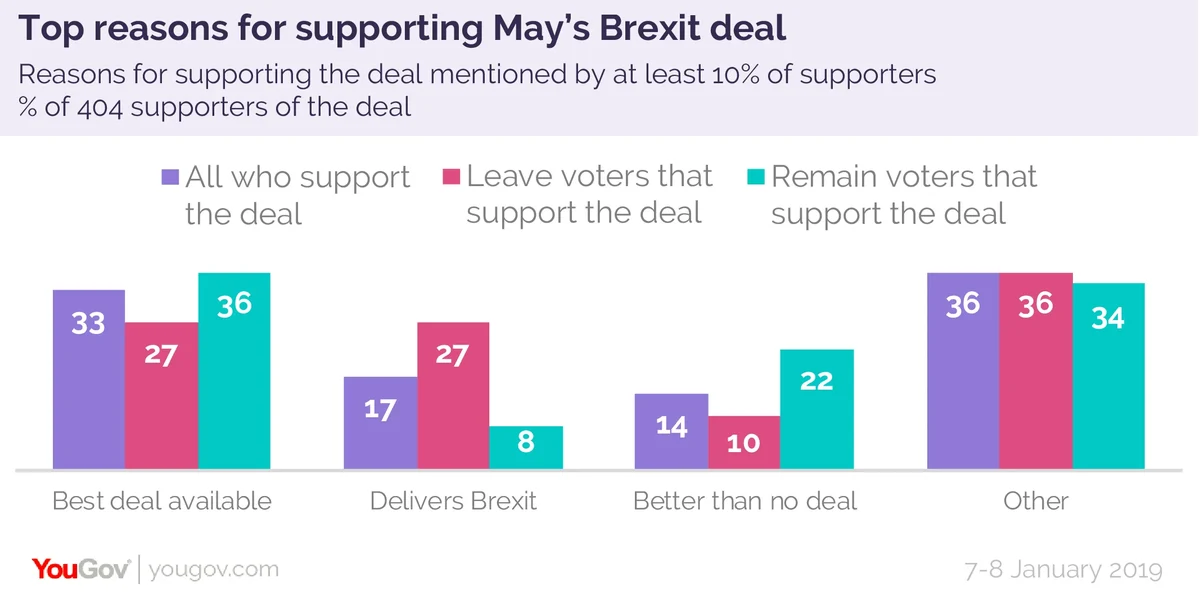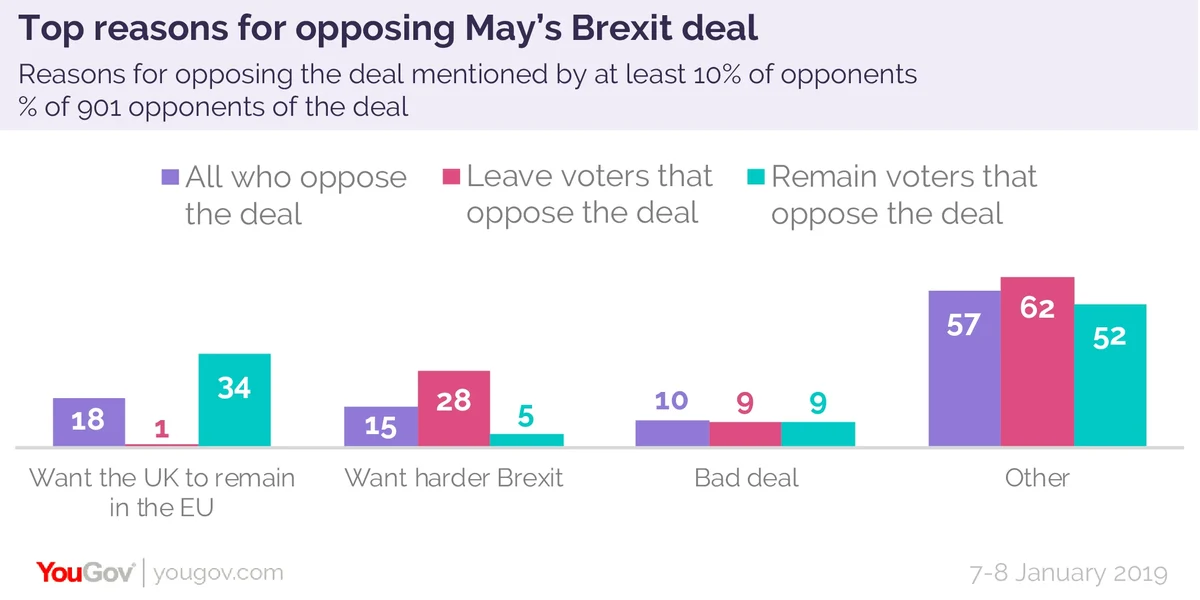A guest commentary by Oxford University's Professor Stephen Fisher and Eilidh Macfarlane, and QMUL's Professor Tim Bale
We know – at least we think we know – that voters don’t think much of Theresa May’s deal. But we don’t really know why – until now, perhaps. A YouGov survey of 1754 adults in Britain conducted on 7-8th January helpfully asked them if they’d expand on their reasons for either opposing or supporting the government’s Brexit deal – and their write-in responses help us dig a little deeper into their reasoning.
But before we do that, some headline numbers. Altogether, it looks as if only around a quarter (23%) of the electorate support the deal, while half (49%) oppose it. And, consistent with some previous analysis, people’s feelings about the deal seem to be more strongly linked to how they voted at the 2017 general election than how they voted in the 2016 EU referendum. While 39% of Conservative voters support the deal, that’s true of only 14% of Labour voters. Although partisan divisions are, if anything, more important than Leave/Remain divisions in explaining who supports and who opposes the deal, it turns out that the reasons people give for their support or their opposition depend mainly on whether they voted Leave or Remain.
Reasons for supporting the deal
If we turn first to those who support the deal, the single most popular reason they give, mentioned by 33% of deal supporters, is that the deal is simply the best on offer. Comments such as “I feel it’s the best we’re going to get” and “we need a deal and it could be worse” are hardly ringing endorsements for the Prime Minister’s deal.

The next most common reason for supporting the deal – mentioned by 27% of Leavers who support the deal (compared to just 8% of Remainers who do so) – is that it “delivers” Brexit. For many of these respondents, the primary concern appears to be quickly enacting Brexit, urging the government to “get on with it”.
The third most common justification for supporting the deal is yet another unenthusiastic reason, namely that it is “better than no deal”. Indicative of how subdued such responses are is one that says “purely because no deal would be so much worse”.
At best, just 5% of those who supported the deal were clearly positive about it. Not even all of these said it was good. Just one person, out of 404, said that they “like” it. Enthusiasm for the deal, even among its supporters, is in short supply.
Reasons for opposing the deal
What about the reasons given by people for their opposition to the deal? Well, these are quite varied, with even the most popular (wanting the UK to remain in the EU) is mentioned by just 18% of deal opponents. Unsurprisingly this was far more commonly cited by Remain voters while attracting few (although not zero!) mentions by those who voted Leave in 2016. Most Remainers, are still convinced that, as one person put it, “the best deal is to stay in the EU”. Hardly anyone is opposing the deal because they’re hoping for the Norway option. Also, wanting a referendum was mentioned by very few people on either side of the divide – probably because most of those who want one are Remainers for whom it is primarily a way of getting what they most want, namely to stay in the EU.

Diametrically opposite is the second most popular reason for opposing the deal: a preference for a harder Brexit. Some were clear that they wanted a no-deal Brexit while others complained that the deal was not a “full” or “proper” Brexit. Some went further to remark that the deal “is not what we voted for” – “I voted out. I did not vote for a deal”.
The third most common reason for opposing the deal, and one expressed by 9% of both Leave and Remain voters who are against the deal, is a complaint about the quality of the deal. This category lacks specific reasons but includes descriptions such as “fudged”, “shambolic” and even “a load of rubbish”. Such blanket dismissals were more common among those who do not pay much attention to politics, as were complaints that the deal is confusing and unclear.
Concern about the UK still having to follow EU rules is the fourth most cited reason for opposing the deal. It is mentioned by some 8% of opponents, including 14% of those who are Leave voters. Sovereignty is the main substantive reason among Leavers for opposing the deal, in marked contrast to the paucity of deal supporters claiming sovereignty as a reason for accepting the deal. Less than two percent of those in favour of the deal explicitly mentioned any gain in sovereignty or control, including of immigration, as a reason for supporting it. Supporters of the deal might believe that it restores sovereignty to the UK, but if they do that virtue is not at the forefront of their minds.
Of the various other reasons for opposing the deal, 5% mention Ireland or the backstop, and 2% mention the divorce bill, but very few other features of the deal, or the possible consequences of the deal, are mentioned. In fact, the reasons given for opposing the deal tend towards the general rather than the particular. It’s also worth noting that one in twenty people admitted they didn’t really know why they opposed the bill; they just did.
What do reasons tell us?
Those who watched Benedict Cumberbatch play Dominic Cummings entreating Leave campaigners to ‘hit them with 350m quid and Turkey!’ in Brexit: the Uncivil War might be interested to note that literally no-one in this survey mentioned Turkey or £350m! And the two (yes only two out of 1305) respondents who mentioned the NHS did so to express concerns about the negative consequences of Brexit.
It seems, then, as if the supposedly powerful and very particular slogans from the 2016 Leave campaign have now been superseded by more immediate concerns – but those concerns centre around the general merits or otherwise of the deal negotiated and Brexit itself rather than a series of specific costs and benefits that might arise as a result of leaving the EU. Moreover, people’s views as to those merits or demerits seem in the main to be driven by what people voted back in 2016. The views expressed may have changed, but few have changed sides.
Those who oppose the deal say they do so mainly because they either never wanted Brexit in the first place or because they’re convinced it’s a bad deal, often because they feel it doesn’t deliver the hard Brexit they’d ideally like. As for those who support it, few actually think it’s a good deal. The rest are prepared to live with it because at least it means we’re leaving or because it’s the best deal on offer – or because, ultimately, it’s better than no deal.
If, in the end, the deal does pass, it may be greeted with relief. But celebration? We doubt it.
Photo: Getty







